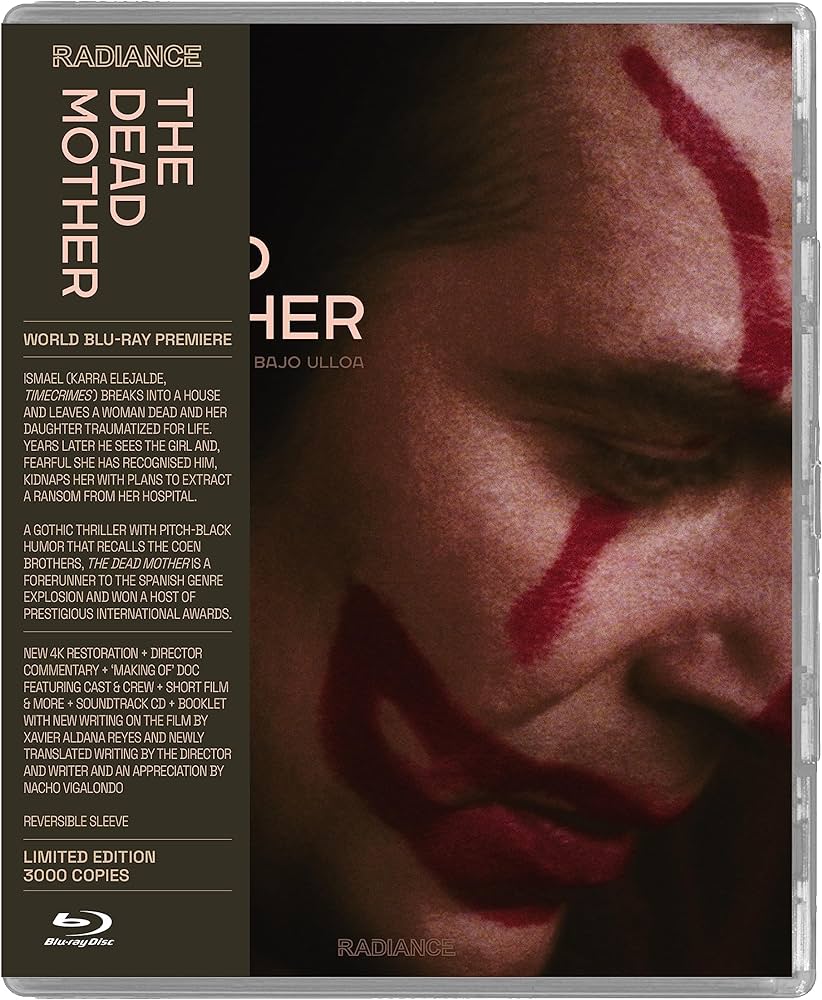A thief named Ismael breaks into an art gallery with the intent of executing a simple burglary. Before we the audience fully register what has happened, the thief has callously murdered a woman while her daughter watches. The girl walks up to her mother, unable to comprehend what has happened. She sees Ismael and he sees her. He points the gun to her head. We hear the bang and the credits roll. We then jump forward 20 years. The girl, Leire, is now in an asylum, having survived the attack by Ismael but having suffered severe brain damage rendering her infantile intellectually. Unfortunately for Leire, Ismael knows where she is and has been watching her, worried that she can still identify him for the murder of her mother so many years before. With his erratic and unstable girlfriend Maite, Ismael kidnaps Leire and chains her to a bed with the intent to kill her. But will he actually follow through on it?
Spain in the early ’90s was a fascinating place for daring and transgressive cinema. Perhaps the most well-known name during this time is provocateur Pedro Almodóvar, heading into 1990 with his manic Tie Me Up! Tie Me Down! and then a couple years later with his controversial Kika. But other directors have secured a place in my graces during this time period including personal favorite Álex de la Iglesia with his demented early efforts Mutant Action and Day of the Beast as well as the offbeat, cryptic films of Julio Medem like Vacas and The Red Squirrel. It’s a cool period in film that I’ve made a mental note to explore more of in the future. Adding to the above is the incredibly dark and strange The Dead Mother. While one can see the neo-noir fused with dark humor stylings of the Coen Brothers’ Blood Simple as an influence, The Dead Mother goes to some very bleak and disturbing places that the Coens have rarely trod while unfolding its story almost as a twisted fairy tale at times. The film attempts the Herculean feat of introducing us to a cold-blooded murderer who has no compunctions with shooting a child in the head but then slowly over the course of the film showing us not only his internal drive and motivations but even going so far as to engender a kind of pity and sympathy for him at times. In other hands, this film could have easily been a gross, cold-hearted exploitation film with no redeeming qualities (This premise seems made for extreme German filmmakers like Olaf Ittenbach and Jörg Buttgereit). But Ulloa gives us a more insightful and nuanced film. And yes, I’m calling this film nuanced despite how over-the-top it is in places. The Dead Mother is an interesting fusion of the gonzo maximalism sensibility and pitch black humor of Iglesia with more grounded character work of Medem. It’s a film that will leave you shocked and empty inside like Ismael, trapped by his own impulses, being pulled down into metaphorical quicksand, unable to escape.
Radiance is swiftly becoming one of my favorite boutique labels. From the great lineup of underseen arthouse and genre films to the meaningful extras that enhance the viewing experience, I’ve been pleased with every release I’ve come across. The picture quality here is quite nice with a 4K restoration supervised by the director himself. This is a film that alternates between a rich color palette almost reminiscent of Tales from the Crypt to very dark, shadowy high-contrast shadows of its noir forebearers, and this transfer shows it all off very well. The audio is comprised of an uncompressed Stereo Spanish track and comes across cleanly with no noticeable distortion. Included are several very nice extras. First a commentary track by the director and his brother Eduardo, who co-wrote and co-edited the film, detailing the various elements of production. It’s a nice listen in general and quite informative. Also included is a documentary on the making of the film. I actually preferred this to the commentary more due to personal preference, show vs. tell. We also get a short film from Ulloa called Victor’s Kingdom released a few years before The Dead Mother and features some of the same thematically grim subject matter. We’ve also got a photo gallery and a trailer to round out the digital extras. On the physical side, we have a nicely put together booklet with material from the brothers Ulloa as well as an interesting essay from Spanish Gothic film critic Xavier Aldana Reyes and an apprioriate appreciation from director Nacho Vigalondo (I can certainly see The Dead Mother‘s influence on his films). Finally we have one of my favorite kinds of physical extras, the CD soundtrack! It’s a great score that fits the gothic neo-noir tone of the film really well, and I’m glad this was included.
What more can I say? Radiance has done it again, capturing a fascinatingly bizarre and disturbing film on disc with a very nice plate of extras. This is an easy recommendation for fans of more subversive cinema.

